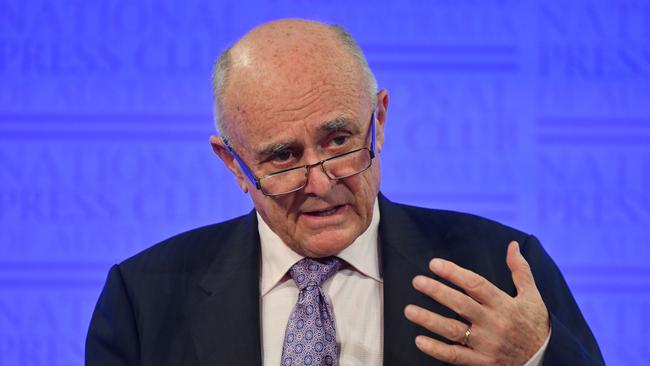
Much to chew over in the workplace dispute between Independent MP Monique Ryan and her chief of staff, Sally Rugg. The most striking claim is that the Teal MP fancied herself a future prime minister, an absurdity that was denied by Ryan on Friday afternoon; she said she was joking.
That’s not to say Rugg emerges from the muck smelling like roses, either. From her overuse of emojis to a cloying job application (“Yours in teal,” was the sign off), to her hypervigilance for snubs and slights – Ryan is accused of walking ahead of her in a corridor once – her affidavits brim with a talent for drama and at least one significant error of judgment.
It involved Rugg boarding a flight from Canberra to Melbourne after testing positive for Covid-19. That she was even on a plane and not in a rental car as allegedly discussed with her boss could be regarded as her first mistake. The second would be disclosing this fact to Ryan, a mask-clinger and pandemic-hysteric of the highest order, only once she was buckled into her seat.
As Ryan noted in an affidavit: “I thought it was morally wrong, and it suggested that Ms Rugg and I were not at all aligned on an issue that was very important to me. It would look like I was condoning that sort of behaviour when that was in no way the case.”

One additional morsel. Rugg’s affidavit laments the difficulties of obtaining the daily list of amendments being heard in parliament, a document known in the halls of power as a “grey”. She said: “The grey is only provided to offices moving amendments. So if we’re not moving an amendment, we have to try get a copy of the grey from a journalist or another office.”
From a journalist? A helper in the gallery? To be fair, it’s not wildly uncommon for reporters and staffers to form, shall we say, alliances of convenience. Better that they remain discreet, of course.
Trying to guess the identity of this mole would be futile; the possibilities are galactic, one best kept for the great annals of Canberra’s most inconsequential mysteries.
Interestingly, and certainly in no way connected, Ryan’s affidavit contains a letter from Rugg sent on January 4 stating that she will no longer be coming into the office. No need for goodbyes or cake. All personal effects can be thrown in the bin, she wrote, except for a calendar and a print that apparently held some value.
“I’ll arrange for (Guardian journalist) Amy Remeikis to collect from the suite,” she wrote. Margin Call contacted Remeikis but she declined to make any remarks.
Fashionable society
It seems anyone who’s anyone had a seat at the National Gallery of Victoria on Thursday night for two events that seamlessly flowed into each other – and we remark upon that with tongue firmly in cheek.
First up was an exclusive exhibition of British designer Alexander McQueen which is said to have delighted few of the men but it did charm a couple of fashion plates in attendance.
Forty-five minutes later it was on to TonyBurgess’ annual dinner for the Melbourne Foundation for Business and Economics. No bold fashion statements there apart from two men who arrived without a tie.
Taking their seats were former Santos boss Ross Adler, NAB’s Ross McEwan, former Qantas chairman Leigh Clifford and CSR chair John Gillam. Nothing too daring from Herald & Weekly Times chairman Penny Fowler, Energy Australia chair Jane McAloon, RBA board member Carol Schwartz or even fashion retailer Naomi Milgrom.
The speeches are said to have gone on a bit and there was some difficulty getting one’s hands on a beverage. But all that was forgotten when student speaker Samrawit Tadesse, a young woman from Ethiopia, told her story of arriving penniless in Perth. The foundation’s scholarships have since helped her into a Bachelor of Commerce at the University of Melbourne.
JPMorgan’s Jennifer Nason, global chairman of investment banking, spoke of a sexism that was “alive and well” and remains underground for the moment. “Women are conditioned to compete for a single seat at one table … don’t fall for it. There are lots of seats at lots of tables,” she said.
Gun for hire
Professor Allan Fels, once the chair of the Australian Competition & Consumer Commission, was a notable presence at another Melbourne function this week, held to fundraise for Ukrainian refugees seeking asylum in Israel. Certainly no shortage of deep-pocketed backers in that room either – our spies counted a large contingent of Smorgans, a handful of Gandels and even a Lowy among the VIPs. The guest of honour was former Israeli prime minister Naftali Bennett.

It’s Fels who piques our interest, given that he’s in line for a fresh job title if NSW Labor leader Chris Minns crushes the Liberal-National government at an election being held three weeks hence.
No shock that Fels is on speed-dial. This is what governments in NSW do with their thorniest dilemmas: they appoint an agriculture commissioner, a supply chain commissioner, or a safe grey suit with a bald head and specs who exudes fiscal responsibility and knows how to fob off questions at budget estimates.
Their salaries? Enormous. Their impact? Negligible. An entire agency was once created out of such people in the middle of the Covid-19 pandemic. It was called Resilience NSW and barely two years later it no longer exists. It’s biggest problem was that no one in government knew what it did.
Minns’ pledge is that he’ll cap weekly toll road charges for drivers and recruit Fels to overhaul the state’s network of pay-per-use roads; it’s a key election promise underpinned by his maniacal obsession with the evils of privatising state assets. The last NSW premier to panic-dial Fels was Mike Baird. That was in 2015 when he hauled him in to serve as the state’s Electricity Price Commissioner on a four-year contract. Baird wanted to lease the state’s poles and wires, and Fels was tasked with approving the bidders.
No issues with privatisation back then. Here’s Fels: “The evidence is that the privately owned networks operate at lower cost, and provide slightly better service than the publicly owned networks.”
Does the same apply to private toll roads? If his work under Baird was to facilitate privatisation, which he did with some alacrity, then his role under Minns seems to be largely undoing it. It’s sounding like he’ll take a fee from anyone!
Never mind that Treasury NSW and Transport for NSW have been undertaking a similar review of toll roads for nigh on 12 months. If Fels does step up he’ll most likely take over – and most of the work will have been done for him.



